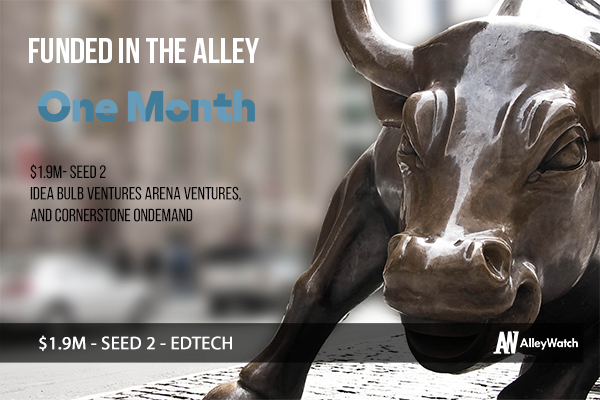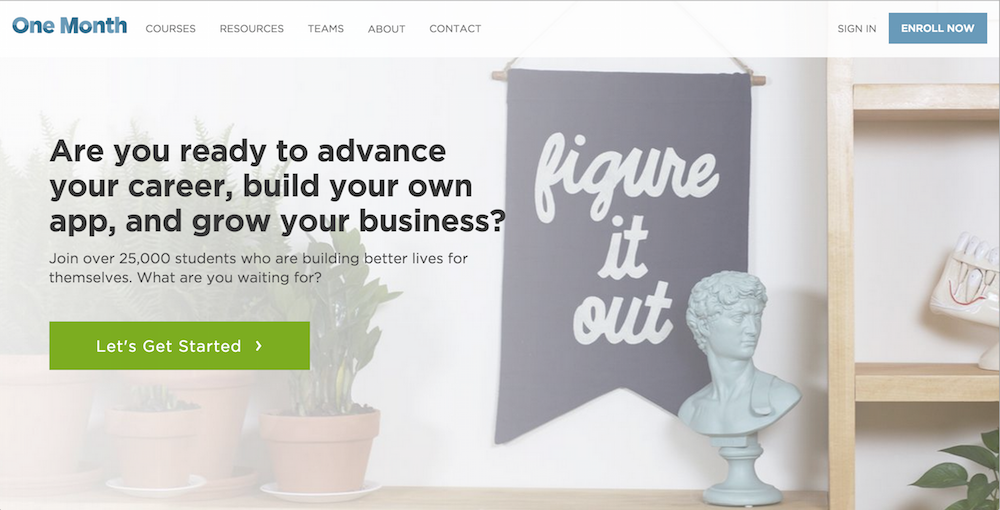One Month, the online school that teaches people vocational skills like how to code and how to run a startup just raised an additional seed round after its first seed a few months back. Built like workout programs, each course is just 30 minutes a day for 30 days and completely project-based. There are no lectures, no classrooms, just real results.
Today, Mattan Griffel, cofounder & CEO joins us to discuss the latest funding and where the company is going.
Who were your investors and how much did you raise?
We just raised an additional seed round of $1.9 million from Idea Bulb Ventures (a previous investor), Arena Ventures, and Cornerstone OnDemand. This puts our total seed round funding to date at $2.6 million.
Tell us about your product or service.
One Month is a modern online school. We teach people useful vocational skills like how to code and how to run a startup. Our courses are all online video courses built like workout programs, just 30 minutes a day for 30 days. And it’s all project-based, so when you’re done you actually have a real product to show for yourself. No lectures, no classrooms, just real results.
What inspired you to start the company?
I got the idea from actually learning how to code on my own. I wanted to start a startup but I got tired of waiting for a perfect technical co-founder, so I taught myself Ruby on Rails in a month and built the first version of my product shortly after. The whole experience raised so many questions for me: Where should I start? What language should I learn? How far would I be able to get? I found that there were no resources out there that answered questions like that for beginners, so that’s where One Month came in.
How is it different?
One Month is different because we’re not an educational marketplace. We’re built like a school. We find the teachers, we create the courses, and at the end of the day we’re accountable to make sure our students are actually able to do something with what they learn. It seems so simple, and yet there’s almost no one else doing what we do, in the same way that we do it.
 What market are you targeting and how big is it?
What market are you targeting and how big is it?
We’re starting off by targeting entrepreneurs. It’s a pretty big market because most people can be entrepreneurs. You’ve got consultants, freelancers, professionals, and even high-school and college students. Our students just want to build a product, and if we can help them do that, then the sky’s the limit to how big the market could be.
What’s your business model?
We have an enrollment fee of $49 per month for one new course per month, or $99 per month for unlimited access to One Month courses.
What was the funding process like?
Fortunately, we had an early investor come to us and say, “We’d like to invest an additional half a million at these terms.” So that started us off, and the rest came through introductions and quick conversations. The whole process took about two or three months but it definitely wasn’t as bad as other people have made it out to be.
What are the biggest challenges that you faced while raising capital?
When we started fundraising, we didn’t have the subscription model set up yet. We were still charging one-time fees for courses. And we weren’t doing any enterprise sales (now we’ve got One Month for Business). So investors were still skeptical that we’d be able to successfully make the switch. Since starting subscriptions three months ago, we’ve hit $1 million in annual recurring revenue, and just signed our 25th enterprise client, so I’d say we’ve been pretty successful.
What factors about your business led investors to write the check?
All our investors believe in the power of education to transform lives. They know that vocational skills like learning how to code are transformative, and that it’s going to be something everything needs to be able to do, so if we can crack the problem before anyone else, the potential market is gigantic. Like, literally hundreds of billions of dollars (http://www.quora.com/How-big-is-the-education-market-in-the-US).
What are the milestones you plan to achieve in the next six months?
We plan on having over ten courses in the next six months and expanding into two new areas: business and design. We’ll also be hiring our first full-time teachers. This is pretty exciting because it brings us into a field that very few startups are going into.
What advice can you offer companies in New York that do not have a fresh injection of capital in the bank?
Make money as fast as possible. You don’t need investors if you’re making money. Being profitable or at least making a little bit of money lets you take investment on your terms. There’s nothing quite as powerful as being able to turn down an investor if you’re not happy with the terms they’re proposing.
Where do you see the company going now over the near term?
A lot of hiring and working out the kinks. We’ve got to focus on things like releasing amazing new courses, reducing churn, building up the enterprise business, and so many more things that we’ve got to crack. It’s going to be a busy few months.
What’s your favorite NY bar, when you need to kick back and relax?
Probably my favorite spot is Ninth Ward in the East Village. I don’t know why I like it so much, but it’s right around the corner from where I live, and there’s a pretty great fountain in the back for sitting outside in the summer. And they’ve got a 2 for 1 happy hour until 8pm every day.





